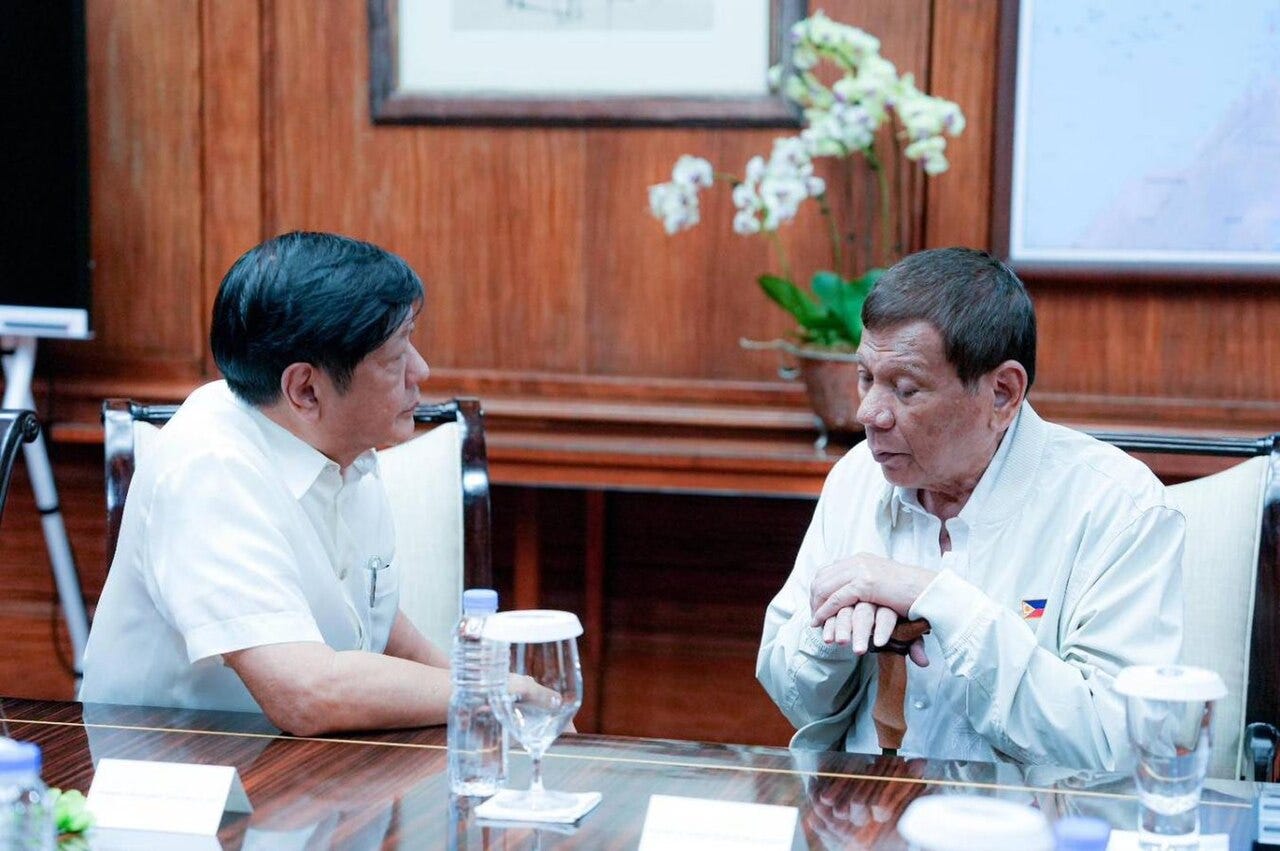Review: Philippines Foreign Policy Amid Marcos-Duterte Dynamics
Game-changing geopolitical and geoeconomic stakes at play amid one of the region's most dramatic political storylines under the tenure of Ferdinand Marcos Jr.
A new book details the game-changing geopolitical and geoeconomic stakes at play amid one of Southeast Asia's most dramatic political storylines under the tenure of Philippine President Ferdinand Marcos Jr.
WonkCount: 1,459 words (~ 7 minutes)
Review: Philippines Foreign Policy Amid Marcos-Duterte Dynamics
Context
"Even during the transition from the Duterte administration to my administration, they did not inform us,”1 Philippine President Ferdinand “Bongbong” Marcos Jr. said of an alleged South China Sea secret pact between China and the Philippines under his predecessor Rodrigo Duterte. His comments, given during his U.S. trip for the inaugural U.S.-Japan-Philippines trilateral summit, reinforced the centrality of Philippine domestic politics across key geopolitical and geoeconomic issues. Indeed, Marcos’ robust engagement of the United States and reversal of Duterte’s China pivot has occurred amid the deterioration of the Duterte-Marcos relationship that has spilled over into the public domain in recent months (see ASEAN Wonk graphic below). The external policy shifts we are seeing under Marcos are also coming after the dramatic return of the Marcoses to power in the 2022 elections for the first time since the downfall of strongman Ferdinand Marcos in 1986, with a joint ticket of Bongbong and Duterte’s daughter Sara2.
Key Philippine Foreign and Security Datapoints and Evolving Marcos-Duterte Dynamics
A new book titled Games, Changes and Fears edited by Aries Arugay and Jean Encinas-Franco analyzes how the Duterte-Marcos transition is affecting policy trajectories across key issues including in geopolitics and geoeconomics3. The book features granular and diverse insights from a range of Filipino specialists that are all based in Philippine academic institutions and research organizations, thereby reinforcing the importance of local perspectives4. Games, Changes and Fears runs 347 pages and has 13 main chapters5.
Analysis
The book provides a comprehensive survey of policy shifts with important consequences for the Philippines. The three main words in the book’s title relate to three interrelated narratives. These are: 1) “Games” related to superpower contest abroad and elite competition at home; 2) “Changes” such as the intensification of securitization and populism; and 3) “Fears” — uncertainties surrounding institutions, society and the economy beyond individual personality shifts6. Understanding these narratives is critical to grasping the impact of shifting Philippine domestic politics in areas of foreign and security policy given the power of both the Marcos and Duterte families. This is embedded in a wider context where over 70 percent of local Philippine politicians by one count — and three of the nation’s last four presidents — have come from major political dynasties7. “Politics may change but dynasties are forever in the Philippines,” the book notes ahead of the country’s upcoming 2025 midterm polls8.
Games, Changes and Fears also forecasts the outlook for key policy areas that are important to watch and will be of interest to scholars, policymakers and businesses alike (see table below for a summary of these priority areas, along with major issues to watch and notable details. Paying subscribers can also read the rest of the “Analysis” section and “Implications” section looking at how these dynamics may play out in the future)9.





